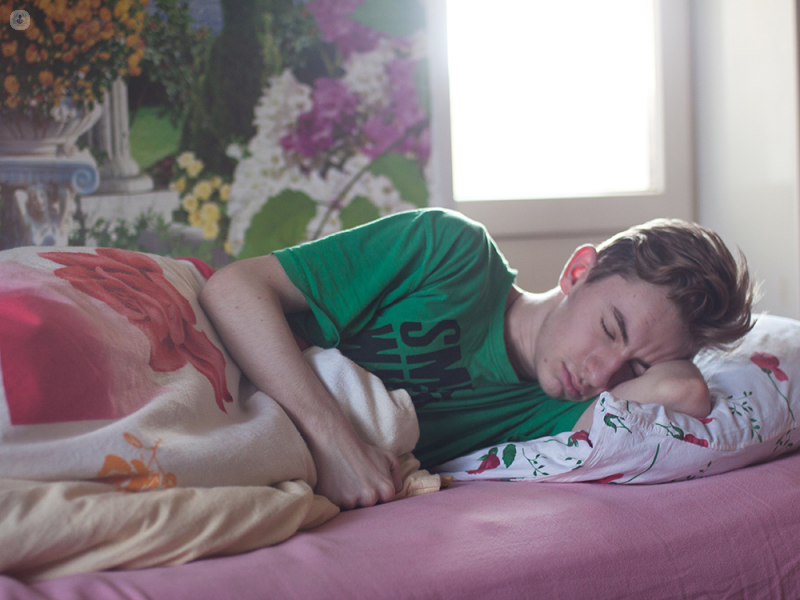Parent info understanding PoTS syndrome children
Escrito por:PoTS is a chronic condition that can cause your child to experience dizziness, an elevated heart rate and palpitations when sitting or standing up. While the condition often develops in teenagers, it has been known to develop in children too.
We spoke to one of our top paediatricians, Dr Pramod Nair to understand more about this condition and what treatments are available.

What is postural orthostatic tachycardia syndrome (PoTS)?
PoTS is a condition where the autonomic nervous system doesn’t work properly and causes problems with blood flow. The autonomic nervous system is part of the nervous system that controls automatic functions that we don’t need to think about, such as circulation, breathing, gut motility, etc. When there is something wrong with this, it can cause poor blood return to the heart from the peripheries and thereby the brain, resulting in your child experiencing dizziness when they are in an upright position. Consequently, the heart responds by increasing the heart rate to improve the circulation which causes them to experience a significantly higher than normal heart rate - a very classical symptom of the condition. A slight increase in heart rate is normal when we all assume an upright posture but in PoTS, this change is more drastic in the range of 30-40bpm.
Other symptoms can appear, such as:
- Palpitations
- Abdominal pain
- Fatigue
- Headaches
- Cold peripheries
- Nausea
- Fainting
- Urinary incontinence
- Difficulty concentrating and exercising
As before mentioned symptoms are worse in an upright posture which, therefore, limits your child’s ability to perform regular day-to-day activities and can affect their quality of life.
How serious is PoTS?
PoTS isn’t a serious condition but can cause long term difficulties. The severity ranges from mild to severe and its effect differs from patient to patient. There are also different types of PoTS such as primary dysautonomic, hyperadrenergic and secondary which determine the long-term outlook.
In the severe sub-group, the child is usually bedbound and experiences most of the symptoms noted above. In milder cases, however, the child can pursue a normal life with certain lifestyles changes and occasionally, may need to take medications. For children in the primary dysautonomic subgroup who develop symptoms during adolescence, there is a good chance that they will outgrow the condition after their teenage years.
How did my child get it?
We don’t know exactly why or how children develop this condition and it is still under investigation. There could be various triggers such as the onset of adolescence, a recent viral illness, prolonged immobilisation or psychological stressors. It is more often seen in girls and in children who have hypermobile joints. There are also other medical conditions which could lead on to the development of PoTS such as chronic fatigue syndrome (deconditioning type), diabetes, sarcoidosis and lupus.
Are any investigations needed?
If the condition is persistent, your doctor might consider carrying out one or more of the following tests:
- ECG
- Chest X-ray
- Basic blood tests
- Echocardiography (ultrasound of the heart)
- Tilt table test
Is PoTS treatable and what are the treatments?
Yes, PoTS is treatable and the treatment that your doctor offers will depend on the cause and severity of your condition. This may include advice on fluid and salt intake, medications to reduce the heart rate or increase the blood pressure, cognitive behaviour therapy, lifestyle and diet changes, targeted exercise etc.
What should I ask the paediatrician?
It’s important that before you go to see the paediatrician that both you and your child prepare some questions for the specialist to answer so that you can leave better informed and without any doubts. Questions you may want to consider asking include:
- Is it PoTS or not?
- What type of PoTS might it be?
- What is the long term outlook?
- What are the possible side-effects with the medications?
- What are the non-pharmacological management strategies?
Are there any long-term complications?
There are usually no long-term complications as PoTS gradually improves as the child transitions into adulthood; however, it does depend on the underlying cause. In some cases, it could cause significantly restricted activities. Most teenagers make a full recovery by early adulthood.
If you would like to book an appointment to see Dr Pramod Nair for a consultation, visit his Top Doctors profile and check his availability.


